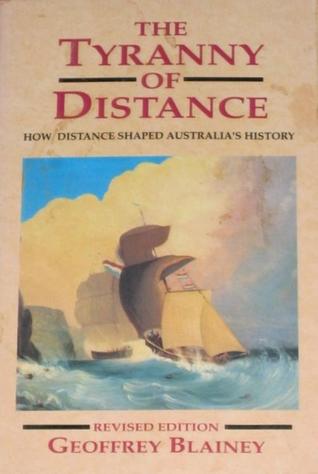One of the sacred text is Australian history is Geoffrey Blainey’s ‘The Tyranny of Distance’ (1966), which made his name and ever after he pontificated on anything and everything until no one (starting with me) listened to him any more. I read it 1974 and not since. The thesis of the book, as I remember, was simple. The great distance of Australia’s English settlements from England made the Europeans in Australia both self-reliant and hostile to, though dependent on, the distant authority because it was unreliable.

The term ‘tyranny of distance’ pops up now and again in the popular media as it did today in a piece on the business pages of Rupert Murdoch’s organ, ‘The Australian.’ There Bernard Salt (‘The Dallas Line,’ 4 February) told readers that Sydney (which is Australia) is more than a plane ride (with current technology) from much of the world. OK, that is certainly true. No airline flies direct, non-stop from Sydney to London or from Sydney to New York City. This, he contends is detrimental to Australia because that is where the money of the world is. OK, that is also true, but what is the detrimental part? That was not articulated, instead the mantra distance is tyranny was cited. One pictures travellers lugging bags of dosh around inside that London-New York nexus unable to change planes, such is the size of dosh bags, in Los Angeles or Dubai.
The news is, and perhaps this is news to some, that money moves around the world in click of the keyboard as the cascade of financial crises around the world has repeatedly shown. Distance does not insulate any country from such financial calamity. That fact is ritually reiterated on the business page of the organ of Murdoch several times a week. Salt describes himself as a futurist on his web site. Think about that.
By the way, the other side of the tyranny of distance that Blainey mentioned was that in the Eighteenth and Nineteenth Centuries distance did insulate Australia from some of the more dopey and ephemeral fads that came and went elsewhere before they made the trip to Australia. No Edsel or Apple Newton made it to these shores. Not from all such fads but some. It also insulated Australian from some infectious disease epidemics. No more. Bad ideas are replicated here within twenty-four hours.
The distance was measured in travel time as much as miles. Blainey wrote about Australia as remote but of course it was not remote to its aborigine in habitants, nor was it far from the South East Asians who regularly visited the northern shores.
The colonial master in the formative period of Australia’s European history was a long way away in both space and time. It might take, at best, six months to travel from Sydney to London. Moreover, it was unsure. Ships turned back; some were even less fortunate. Others jettisoned cargo, like correspondence, in heavy seas and so the letter went unanswered. When word did come through from London it was so late as to be laughable, fertilising the attitude that authority was remote, anonymous, and stupid.
The result was the Australian political culture of the 1970s, one that entwined a dependence on government for nearly everything from the marketing of eggs to trimming of hedges, while disparaging government and all who worked for it as cretins. Australians wore this anti-authoritarianism with pride, automatically against the government even while waiting for the next handout from it. Rather like a teenage boy rebelling against his parents while pocketing the weekly allowance and storming off to a room provided by the detested parents.
For Australia the first breach in the tyranny of distance was the Boeing long distance jets that supplanted ships for the travel of mere mortals in the 1970s. There followed a generation later the digital world which has shaken many of the most solid institutions like newspapers themselves.
Why read Murdoch’s organ when I can click up BBC News, Le Monde, or Deustche Welle? (My personal answer, since I have been asked this, is the local news that will never make it to these outlets, and the reviews, cultural, and entertainment information. And the nonsense that ever fewer, ever more desperate journalist write, which provides unintended – always the best kind – entertainment. And reading them on paper is still more convenient that on screen.)
When the fad for small government was born on the winds of Proposition 13 (that was referendum for the taxpayers’ revolt in California) in 1978, the spores circled the globe and arrived in Australia rather like the cloud of radiation in Neville Shute’s ‘On the Beach,’ Australians happily shrank government. The one example I witnessed firsthand was the higher education division in the Federal Department of Education which shrank from 400 to 40 to 14, probably 4 now. Each successive government wins office on a pledge to cut government spending, and cut they do. This is now a forty year race to eviscerate government.
Of course a lot of things go wrong as the cuts were made, but as one prime minister said, ‘Not our fault.’ End of that story.
Strangely enough though government has vacated many realms from airlines to docks, the tax bill has not decreased but the automatic anti-authority posturing has decreased so some good has come from it. Though poseurs quickly find other posture to affect, it is true to say.
Skip to content
